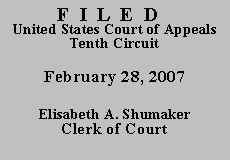

| UNITED STATES OF AMERICA,
Plaintiff-Appellee, v. WILLIAM R. SATTERFIELD, Defendant-Appellant. |
(D.C. Nos. 05-CV-373-HDC and 04-CR-123-HDC)
|
The district court addressed the restitution issues first and held that because the language of 28 U.S.C. 2255 only allows the court to grant relief to federal prisoners claiming the right to be released, challenges to restitution orders are not cognizable, even when coupled with a challenge to a sentence of imprisonment. The district court therefore held that it had no subject matter jurisdiction over those issues. As to the remaining issues, the district court held that they were precluded by the waiver of appeal in the plea agreement and that Mr. Satterfield could not show ineffective assistance of counsel such that the plea agreement should be set aside.
Mr. Satterfield filed an application for a certificate of appealability (COA) with this court seeking to appeal all of the issues raised before the district court. This court previously granted a COA on the question of whether a movant may challenge the restitution portion of his sentence in a motion filed pursuant to 28 U.S.C. 2255. See Miller-El v. Cockrell, 537 U.S. 322, 336 (2003) (stating that until a COA issues under 28 U.S.C. § 2253(c) "federal courts of appeal lack jurisdiction to rule on the merits of appeals" of 2255 applicants). We now exercise our jurisdiction regarding that question, see 28 U.S.C. 1291, 2255, and affirm.
Under 28 U.S.C. 2255:
[a] prisoner in custody under sentence of a court established by Act of Congress claiming the right to be released upon the ground that the sentence was imposed in violation of the Constitution or laws of the United States . . . or that the sentence was in excess of the maximum authorized by law . . . may move the court which imposed the sentence to vacate, set aside or correct the sentence.
Mr. Satterfield cannot challenge the amount of restitution awarded by way of a 2255 motion, however, because he is not "claiming the right to be released" from custody based on his claim. See, e.g., United States v. Bernard, 351 F.3d 360, 361 (8th Cir. 2003) (citing cases).
Consequently, the district court's dismissal of this claim for lack of subject matter jurisdiction is AFFIRMED. As to the remaining arguments raised by Mr. Satterfield in his application for COA, we agree with the reasoning set forth by the district court in denying those arguments; hold that he has failed to make "a substantial showing of the denial of a constitutional right," 28 U.S.C. 2253(c)(2); and DENY his application for COA. Mr. Satterfield's appeal is therefore DISMISSED.
Entered for the Court
Circuit Judge
*. After examining the briefs and appellate record, this panel has determined unanimously to grant the parties' request for a decision on the briefs without oral argument. See Fed. R. App. P. 34(f); 10th Cir. R. 34.1(G). The case is therefore ordered submitted without oral argument. This order and judgment is not binding precedent, except under the doctrines of law of the case, res judicata, and collateral estoppel. It may be cited, however, for its persuasive value consistent with Fed. R. App. P. 32.1 and 10th Cir. R. 32.1.
1. Mr. Satterfield admitted in his plea agreement that he "knowingly and willfully participated in a conspiracy with other individuals to reset, alter, or disconnect and replace odometers in more than 424 used motor vehicles" most of which "were 'high end' vehicles." R., Doc. 9 at 8.